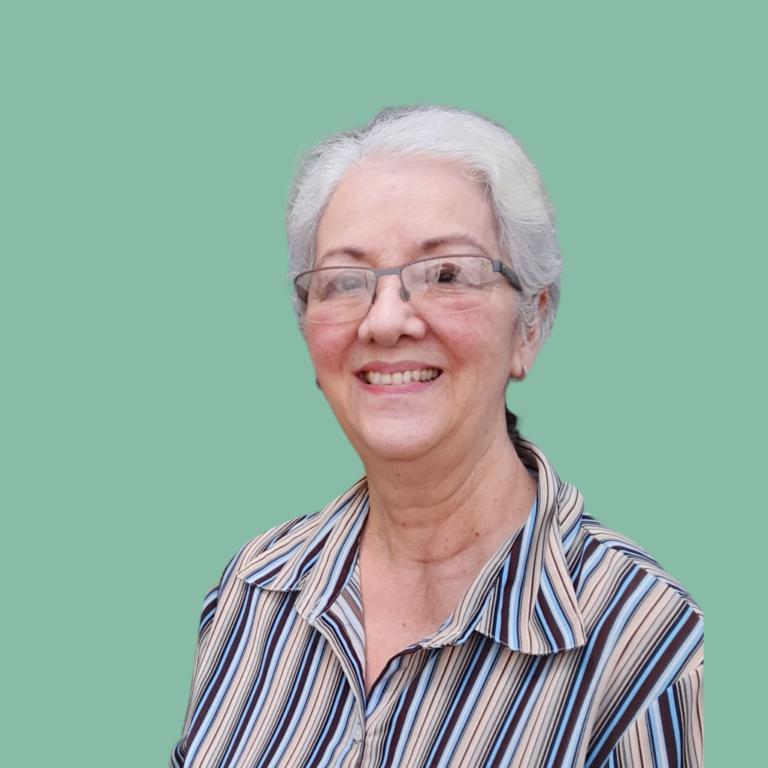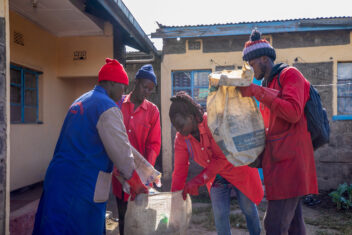Sustainability & partnerships: Victoria Rudin Vega (ACEPESA) interview

Diving back in history
WASTE and its partners around the world have been changing the development game for nearly 4 decades. We have together developed sustainable and inclusive solutions to many challenges in the waste management and sanitation sectors. Approaching the organisation’s 40th anniversary, we wanted to revisit some key players from our history of collaborations to learn lessons on how we can maintain the spirit of our founders and early work as we move forward.
The following traces WASTE’s history through three continents and many decades, sharing the stories of 7 pivotal individuals who have contributed to this spirit through our work together. These individuals and organisations have continued to share our spirit of inclusivity in everything they do.
A few key takeaways
- Through our holistic approaches, WASTE and its partners around the world have been working on the underlying concepts of ‘circularity’ for decades. It is only recently that high level discussions have rebranded and called more attention to the importance of what is called today “circular economy”. Circularity is integrated in our approach.
- Working with the informal sector is difficult but a critical component to sustainable waste management systems. All our partners echo that this aspect of the work as pivotal to the inclusion and innovative nature of their work.
- Institutionalisation of key concepts and approaches in policy, whether on local or national scales, are crucial for ensuring sustainability of our work.
- Buy-in from the communities, especially local leaders, can either catalyse the success of or be the sole reason for failure of interventions. We must ensure our programmes and solutions are co-created with and by the communities we are trying to serve.
- Real change and local ownership take time to have sustained impact. Our projects, ambitions, and relationships with key stakeholders, shouldn’t forget this key consideration.
Gamechanger 3: Victoria Rudin Vega
Director, Asociación Centroamericana para la Economía, la Salud y el Ambiente (Central American Association for Economy, Health and Environment, ACEPESA)
San Jose, Costa Rica
“The Integrated Sustainable Waste Management (ISWM) model itself considers circularity at its core, but now everybody is talking about the ‘circular economy’. We are learning more about it, because…it is an issue linked with climate change and deals with the design of products, not just the management of waste.”
*Asociación Centroamericana para la Economía, la Salud y el Ambiente (Central American Association for Economy, Health and Environment, ACEPESA) started working on solid waste management in 1991.
1. What is the thematic focus of ACEPESA and what kind of projects you are currently working on?
The thematic focus of our work is integrated solid waste management, water, and sustainable sanitation, linked to climate change adaptation and mitigation, all related to local economic development. Some projects we are currently developing refer to the improvement of municipal composting processes and products, (organic waste treatment and fundamental for mitigating greenhouse gas (GHGs) emissions. We are also working on the inclusion of informal waste pickers in municipal waste management systems, strengthening community water systems, and the promotion of alternative systems for wastewater treatment, through constructed wetlands.
2. When and for what projects have you partnered with WASTE in the past?
We started working with WASTE in 1996 on Latin American research on waste management in micro- and small enterprises and cooperatives. Since then, we have partnered to implement the Urban Waste Expertise Programme (UWEP), then in ISSUE 1 and 2 projects. We jointly implemented a project for WEEE (Waste of Electric and Electronic Equipment) Management with funding from the Costa Rica-Netherlands Bilateral Agreement.
3. Can you describe a little more about your work process with WASTE?
We worked in a very well-coordinated way. WASTE contributed significantly to our development as professionals in the field of solid waste, introduced us to networks with other organisations. We also worked together on the development of technical materials. There was always clarity and transparency. Specifically, the focus of the UWEP project was on the municipality of La Ceiba in Honduras. ACEPESA had the role of coordinating and providing assistance to local partners who oversaw implementation on the ground. In turn, WASTE supported the cohort with technical assistance and capacity building. In ISSUE, the dynamics changed a bit as the emphasis was on sanitation, which was something totally new for us. There, WASTE was fundamental. This pushed us to work on sanitation, an issue that, to this day, is central to ACEPESA. Similarly, with WASTE’s technical support, we learned from the Netherlands’ experience in WEEE management, which propelled us as one of the leading countries on the subject in Latin America.
4. What were some of the key take aways for you and ACEPESA from that early collaboration?
A fundamental element that always guides our work in waste management to date is the Integrated Solid Waste Management (ISWM) model, which we were privileged to learn directly from WASTE’s co-founder, Arnold, along with the other founders. Prioritising the informal sector is another lesson that continues to motivate our work. Similarly, we continue to promote the sustainable sanitation approach. It is here that we find the main challenges, as we initially met more resistance to its implementation than in more traditional approaches. Another key learning was to work collaboratively with other organisations, to learn from others, and to drive change together.
5. How does the informal sector play a role in your work?
There is a regional project for all Latin America working on informal sector inclusion, it is called Latitude Aire, funded by the Asian Development Bank (ADB) and Coca-Cola amongst others. Now they are supporting some big activities and projects in Central America and the Caribbean to find how to get local governments to integrate the informal sector into the municipal process. For example, what the municipalities understand sometimes from our own solid waste law from 2010, is that they must do the recycling themselves, and thus, usually avoid the existence of the informal sector entirely. So, we are working with municipalities to integrate the informal sectors, especially in the collection and segregation process of waste management
We do not have sufficient data regarding the people who are working informally. So, it is difficult to know who and where they are.
6. Was the Integrated Sustainable Waste Management (ISWM) model adopted scalable in your work?
ISWM was adopted as an approach in the formulation of the country’s municipal waste management plans, so I would say yes. We were responsible for formulating the manual (with support from GIZ (Gesellschaft fuer Internationale Zusammenarbeit)) that guides the process. In terms of sustainable sanitation, thanks to our work, constructed wetlands are widely accepted in the country and throughout the Central American region.
7. What aspects did not work out on the ground?
In the case of the UWEP project mentioned before, it was not possible to follow up the implementation of the project in Honduras due to the distance. At that time, it was not easy to set up remote communications. In the case of Honduras, a factor that was always a constraint was the changes and influences of local politics. In terms of sustainable sanitation promoted within the framework of the ISSUE project, there was no social acceptance of dry toilets as there is a strong culture of using water for cleaning. Experiments with the collection and storage of human urine were started, which seemed to us to be a critical issue. However, we did not get the institutional support to be able to continue developing the experiences.
8. What do you think about the aspect of circularity in this work?
The ISWM model itself considers circularity at its core, but now everybody is talking about the ‘circular economy’. We are learning more about circular economy, because for instance in a place like Costa Rica it is an issue linked with climate change and other such topics, and deals with the design of products, not just the management of solid waste.
The concept of circularity is also more asked on the ‘high’ government and private sector levels. But the people are more concerned with direct issues of sanitation, wastewater, what do they do with waste and other such visceral issues. In Costa Rica, the issue of climate change is more in focus.
9. What are your thoughts on the future of the waste management sector?
Solid waste will remain a critical issue. We have been working on plastic pollution and marine litter since Costa Rica has two oceans. We must deal with both. We must find solutions to treat the waste that is recovered from the seas and rivers. We do not have solutions right now. Some people are sending it to cement factories, but there are few solutions and approaches to deal with this issue currently. Electronic waste is another issue that is relevant for us. We have made some progress but still there is a lot more to do. In the past, municipalities did not want to engage with organic waste and preferred to send it to landfills. But over the last few years, because of rising costs, they want solutions for treating and managing organic waste better. We have been working on building a national strategy for treatment and management of solid waste, linked with climate change [mitigation and adaptation]. So organic waste is also a critical issue today.


